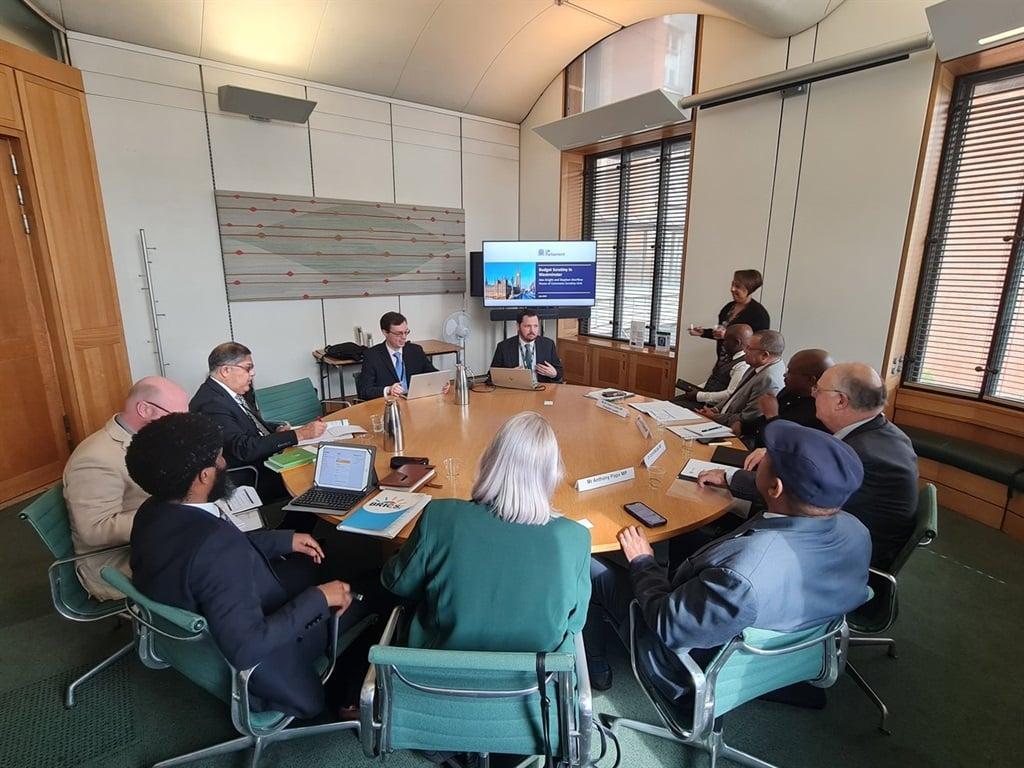Africa-Press – South-Africa. A delegation of the National Assembly Rules Committee visited the UK Parliament to “gain valuable insights” on how the executive in that country is held accountable.
The visit is the product of the ANC’s efforts to postpone the establishment of a committee to oversee the Presidency.
The Presidency’s budget is the only national budget that’s not overseen by a committee of Parliament, even though Section 55 of the Constitution requires that the National Assembly “must provide for mechanisms to ensure that all executive organs of state in the national sphere of government are accountable to it; and to maintain oversight of the exercise of national executive authority”.
The Zondo Commission into state capture also recommended the establishment of such a committee.
“Our recent history also shows that the president’s conduct is not always subjected to adequate oversight by the existing portfolio committee.
“A process to enable the president and Presidency’s conduct to be subjected to more probing scrutiny than is feasible in a plenary session of the National Assembly would therefore appear to be beneficial,” the Zondo report read.
This has also long been a bugbear for opposition parties and, even before the Zondo report came out, IFP chief whip Narend Singh proposed the establishment of such a committee.
The ANC pulled out all the stops to delay the formation of such a committee when it was first discussed by the subcommittee of the Rules Committee, and then by the Rules Committee, and it insisted on more research.
National Assembly Speaker Nosiviwe Mapisa-Nqakula, who chairs the Rules Committee, proposed the “study tour” to the UK.
And so, a delegation from the committee, led by chair of chairs Cedric Frolick – who chaired the sham ad hoc committees on Nkandla and was named in the Zondo report, but has since been cleared by Parliament’s ethics committee – had several meetings with the heads of oversight committees and officials in the House of Commons on Tuesday.
“These discussions included engaging with the Procedural Committee, which serves as the equivalent of our Rules Committee, and the Liaison Committee, responsible for overseeing the prime minister,” a statement from Parliament read.
The delegation discussed and shared experiences with Karen Bradley, chairperson of the Procedural Committee and had a productive discussion with Sir Bernard Jenkin, chairperson of the Liaison Committee, where they explored the committee’s composition, role, and functions.
“These series of engagements with representatives from the structures of the UK Parliament are of utmost importance in enhancing our understanding of international best practices and gaining valuable insights.”
The meeting will inform Parliament’s “ongoing consideration of establishing an oversight mechanism for the Presidency, as recommended by the Judicial Commission of Inquiry into Allegations of State Capture, Corruption, and Fraud in the Public Sector, including Organs of State”.
According to the statement, there was particular emphasis on the Liaison Committee of the UK Parliament, which began its oversight of the prime minister’s actions in 2002, during the tenure of Tony Blair.
The Liaison Committee carries out various crucial functions, such as considering general matters relating to the work of select committees, reporting select committee reports to the house for debate, and hearing evidence from the prime minister on matters of public policy.
It is composed of chairpersons from 35 select committees, and during each session, only 12 to 14 chairpersons are permitted to question the prime minister. The Liaison Committee focuses on the strategic policy and political issues relating to the prime minister and does not oversee the office’s budget.
Oversight over the budget of the Prime Minister resides with a select committee.
Frolick said they had “very, very insightful input” from Jenkin.
“What is incumbent now on us is to see how we can improve the oversight generally, on the Presidency. We do have existing oversight structures that are in place. What can be enhanced? What can be finetuned? And when it comes to, specifically, financial oversight in the Presidency, where that could be located,” said Frolick.
ANC MP Hope Papo, who is Deputy President Paul Mashatile’s parliamentary counsellor and who advocated vociferously for “further research” on establishing a committee overseeing the Presidency, said they received “important information” on the Liaison committee’s functioning.
“That information will be analysed and scrutinised to see how it will fit in with our own National Assembly committee system,” Papo said.
DA deputy chief whip Annelie Lotriet said the meeting was helpful, particularly Jenkin’s idea of forward-looking accountability.
“There are many lessons for us. Obviously, we will have to tailor make it for our South African situation, where we sit with a president and not necessarily a prime minister,” said Lotriet.
FF Plus chief whip Corné Mulder found the engagement very constructive.
“To me, the biggest takeaway, I think, was that we also need to understand that there is a place for party politics, and there’s a place to understand where parties cooperate in the best interests of the country, and the best interests of moving forward,” said Mulder.
Singh said they established that there was a need for oversight over the prime minister. After resistance, the Liaison Committee was established in 2002.
Singh said:
In April, the ANC contingent on the Rules Committee shot down the Zondo Commission’s recommendation that Parliament should consider having opposition members chair some committees.
The South African delegation, which also includes ANC MP Qubudile Dyantyi, had discussions involving representatives from the Climate Change Commission, Institute of Government, and a meeting with Sir Malcolm Jack, former Clerk of the House of Commons, on Wednesday.
UK Prime Minister Rishi Sunak last appeared before the Liaison Committee on 4 July.
The Guardian reported that Sunak dodged MPs’ questions about whether he would meet his self-imposed targets for inflation and stopping small boat crossings and that he appeared “peevish” during the 90-minute meeting in which MPs took him to task for his absenteeism from the House of Commons.
For More News And Analysis About South-Africa Follow Africa-Press






